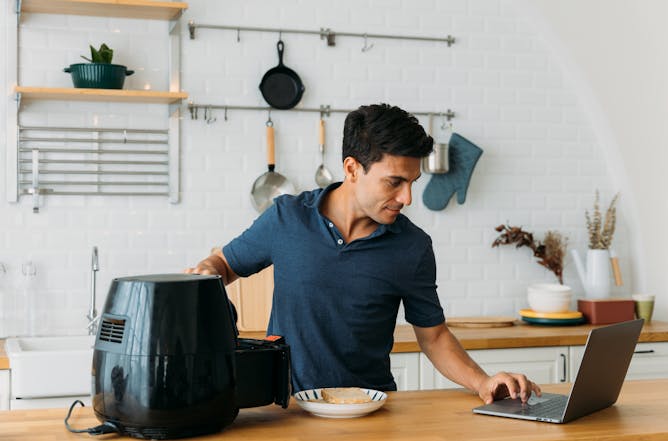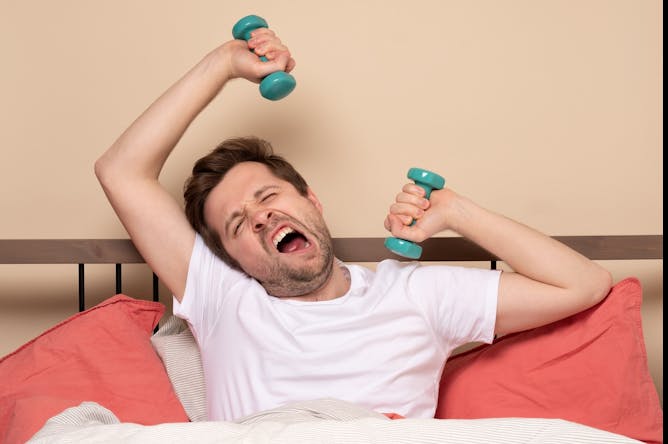|
If you’ve been thinking about getting an air fryer recently, or have dusted off the slow cooker gift you used twice and then banished to the back of the cupboard, then you’re not alone. Soaring energy prices are pushing many people to think creatively about how to save gas and electricity.
If you’re confused about which kitchen appliances can really save you money, product design and energy expert Amin Al-Habaibeh has carried out some mini-experiments in his own kitchen to compare the energy saving specs of air fryers, thermos, slow and pressure cookers with conventional saucepans. He’s even worked out how many months it could take to break even on your investment if you fork out for a new appliance. Meanwhile, my strategy for dealing with the energy crisis has so far been making myself a strong cup of tea every time my monthly bill arrives and fretting about what will happen if I ignore the minimum fill level on my kettle.
Other people are taking a more active approach than me to the big issues facing society. For example, protest group Just Stop Oil recently thew soup at Van Gogh’s Sunflowers painting in the National Gallery in London. A cognitive psychologist gave us their view on whether radical action can do more harm than good. And if you’re losing sleep over the chaos gripping the UK financial markets, read about research showing why taking some exercise might help.
|

|
Jenna Hutber
Commissioning Editor, Science + Technology
|
|

Air fryers are becoming more popular.
Twinsterphoto/Shutterstock
Amin Al-Habaibeh, Nottingham Trent University
I compared an air fryer, thermos cooker and pressure cooker with regular ovens and saucepans to see which used the least energy.
|

Just Stop Oil handout / EPA
Colin Davis, University of Bristol
People want to shoot the messenger, but they do hear the message.
|

Even just one workout can improve your sleep.
RealPeopleStudio/ Shutterstock
Emma Sweeney, Nottingham Trent University
Research also shows us that all types of exercise – whether that’s cardio or resistance training – can improve sleep.
|
Politics + Society
|
-
Francis Pakes, University of Portsmouth
Sweden is considering a deal to send foreign prisoners to jails in other countries – but is this just a way of getting rid of unwanted foreign criminals?
-
Rachel Bynoth, Cardiff University
Many still speculate about what George Canning would have achieved had he not died 119 days into his premiership.
-
Richard Hargy, Queen's University Belfast
The US midterm election could see many deniers of election results gain office.
-
Nicholas Allen, Royal Holloway University of London
The law says MPs have to vote in favour of holding an election – and with the Conservatives facing huge losses, there’s little chance of them wanting one.
|
|
Arts + Culture
|
-
Kathryn Stamp, Coventry University
Strictly continues its work in busting norms in who can or should dance – and who they can dance with.
-
Tim Thornton, University of Huddersfield
Stephen Frears’ film is adding to the furore surrounding Richard III, England’s most controversial king. New research examines what prompts such ferocious debate.
-
Bradley J. Irish, Arizona State University
Going out of your way to get grossed out might seem like a contradiction of human nature. But it serves a strong evolutionary purpose.
|
|
Business + Economy
|
-
Stephen Bevan, Lancaster University
More than half of cancer survivors have to give up work, and employers are partly to blame.
|
|
Health
|
-
Katherine Livingstone, Deakin University
You may have heard about the “carnivore diet”, which, as you can imagine, is made up mostly of meat. Here’s why a balanced diet is a better idea.
|
|
Science + Technology
|
-
Joanna Barstow, The Open University
New telescope allows us to study the atmospheres of planets orbiting stars other than our Sun in unprecedented detail.
|
|
|
|
| |
|
|
27 October 2022
•
Birmingham
|

|
7 November 2022
•
Birmingham
|

|
9 November 2022
•
Swansea
|

|
13 November 2022
•
Birmingham
|

|
|
|
|
| |
| |
| |
| |
| |
|
|